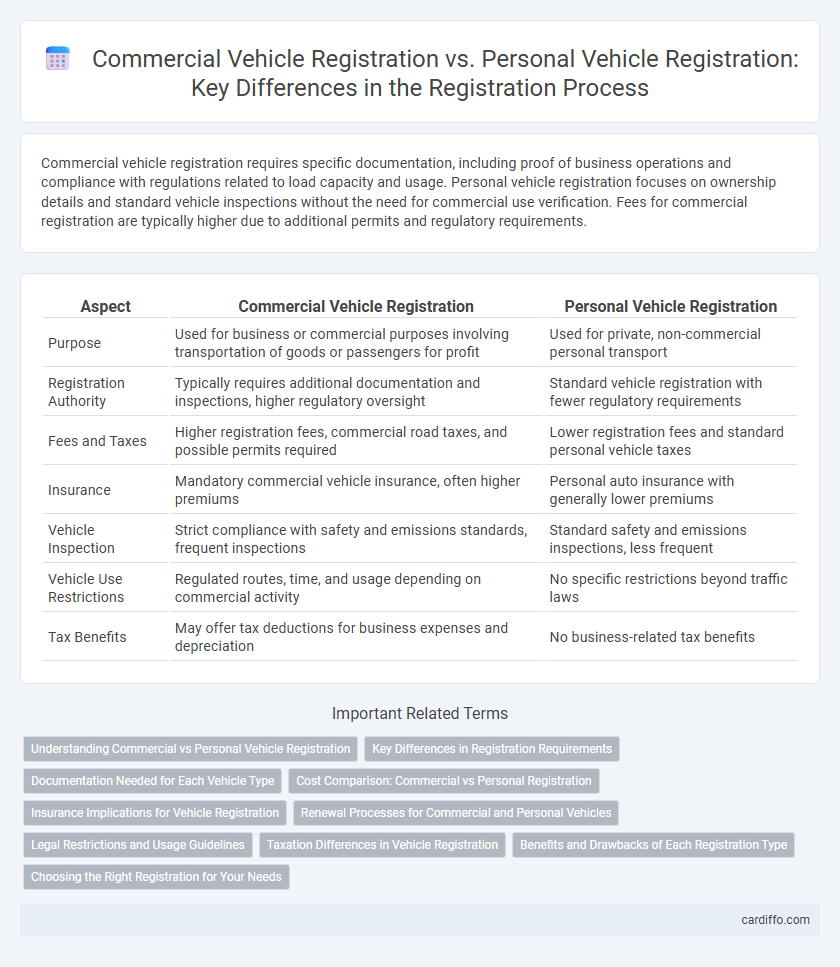Commercial vehicle registration requires specific documentation, including proof of business operations and compliance with regulations related to load capacity and usage. Personal vehicle registration focuses on ownership details and standard vehicle inspections without the need for commercial use verification. Fees for commercial registration are typically higher due to additional permits and regulatory requirements.
Table of Comparison
| Aspect | Commercial Vehicle Registration | Personal Vehicle Registration |
|---|---|---|
| Purpose | Used for business or commercial purposes involving transportation of goods or passengers for profit | Used for private, non-commercial personal transport |
| Registration Authority | Typically requires additional documentation and inspections, higher regulatory oversight | Standard vehicle registration with fewer regulatory requirements |
| Fees and Taxes | Higher registration fees, commercial road taxes, and possible permits required | Lower registration fees and standard personal vehicle taxes |
| Insurance | Mandatory commercial vehicle insurance, often higher premiums | Personal auto insurance with generally lower premiums |
| Vehicle Inspection | Strict compliance with safety and emissions standards, frequent inspections | Standard safety and emissions inspections, less frequent |
| Vehicle Use Restrictions | Regulated routes, time, and usage depending on commercial activity | No specific restrictions beyond traffic laws |
| Tax Benefits | May offer tax deductions for business expenses and depreciation | No business-related tax benefits |
Understanding Commercial vs Personal Vehicle Registration
Commercial vehicle registration involves specific regulations, higher fees, and mandatory insurance requirements due to the vehicle's use for business activities and transportation of goods or passengers. Personal vehicle registration typically requires less documentation, lower fees, and standard insurance policies as it covers private, non-commercial use. Understanding these distinctions ensures compliance with state laws and helps avoid penalties related to improper vehicle classification.
Key Differences in Registration Requirements
Commercial vehicle registration requires detailed information about the vehicle's intended business use, gross weight, and compliance with specific safety and emission standards, whereas personal vehicle registration primarily focuses on ownership and basic vehicle details. Commercial registrations often demand higher fees, additional inspections, and proof of insurance aligned with commercial policies, contrasting with the simpler requirements for personal vehicles. Furthermore, commercial vehicles may need special permits for transporting goods or passengers, which are not relevant in personal vehicle registrations.
Documentation Needed for Each Vehicle Type
Commercial vehicle registration requires specific documentation such as a commercial insurance policy, USDOT number, vehicle weight certificates, and a valid commercial vehicle operator's license. Personal vehicle registration typically requires proof of ownership like a title or bill of sale, valid personal auto insurance, and a government-issued ID. Both types may need emissions test results and payment of applicable registration fees.
Cost Comparison: Commercial vs Personal Registration
Commercial vehicle registration typically incurs higher fees compared to personal vehicle registration due to additional regulatory requirements, insurance costs, and heavier vehicle weight classifications. Personal vehicle registration costs are generally lower and more standardized, reflecting fewer regulatory burdens and lighter vehicle categories. Businesses must budget for these increased commercial registration expenses when managing fleet operations.
Insurance Implications for Vehicle Registration
Commercial vehicle registration requires specialized insurance policies that often carry higher premiums due to increased liability risks and usage frequency. Personal vehicle registration typically involves standard insurance coverage with lower premiums, reflecting limited usage for individual or family purposes. Insurance implications differ significantly, as commercial registrations mandate broader coverage, including liability for goods transportation and employee safety.
Renewal Processes for Commercial and Personal Vehicles
Commercial vehicle registration renewal typically requires additional documentation, including proof of valid insurance, compliance with safety inspections, and payment of specific commercial fees, which differ from personal vehicle renewals. Personal vehicle registration renewal generally involves submitting updated proof of insurance, paying the renewal fee, and sometimes completing emissions testing depending on state regulations. The renewal timeline for commercial vehicles is often more stringent, with some states mandating monthly or quarterly renewals, whereas personal vehicles usually renew annually or biennially.
Legal Restrictions and Usage Guidelines
Commercial vehicle registration requires compliance with stricter legal restrictions, including higher weight limits, regular safety inspections, and specific insurance mandates tailored to business use. Personal vehicle registration typically involves fewer regulatory complexities, with guidelines centered around personal use, standard insurance coverage, and fewer restrictions on modifications. Both types mandate accurate documentation and adherence to state-specific laws governing vehicle operation and ownership.
Taxation Differences in Vehicle Registration
Commercial vehicle registration typically incurs higher taxes and fees compared to personal vehicle registration due to factors such as vehicle weight, usage, and potential commercial activity. Personal vehicle registration taxes are generally based on the vehicle's value, age, and engine size, resulting in lower fees for non-commercial use. Tax authorities impose these differences to account for increased wear and tear, road usage, and regulatory compliance associated with commercial vehicles.
Benefits and Drawbacks of Each Registration Type
Commercial vehicle registration offers benefits such as higher load capacity allowances and the ability to operate for business purposes, but it often involves higher fees, stricter regulations, and mandatory inspections. Personal vehicle registration typically incurs lower costs and simpler compliance requirements, providing convenience for everyday use, yet it limits the vehicle's use in commercial activities and may impose restrictions on mileage or modifications. Understanding these distinctions helps individuals and businesses optimize their vehicle usage based on purpose, cost, and regulatory compliance.
Choosing the Right Registration for Your Needs
Commercial vehicle registration is essential for businesses using vehicles for transporting goods or clients, requiring compliance with specific regulations and higher fees reflecting usage intensity. Personal vehicle registration suits individual owners primarily using vehicles for private purposes, offering simpler processes and lower costs. Assess your vehicle's primary use, insurance requirements, and legal obligations to select the registration that aligns with your operational needs and budget.
Commercial Vehicle Registration vs Personal Vehicle Registration Infographic

 cardiffo.com
cardiffo.com